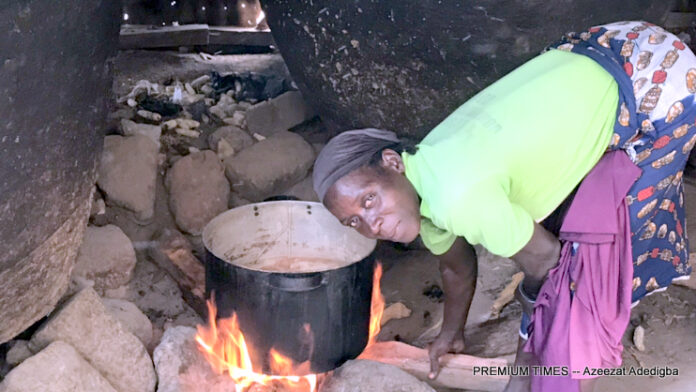By Jeph Ajobaju, Chief Copy Editor
Liquefied Petroleum Gas (LPG) or cooking gas import dropped 20.48 per cent in August, reflecting a shift to alternative energy for cooking, firewood and charcoal, as 7.5 per cent Value Added Tax (VAT) doubles price and impacts households.
The Petroleum Products Pricing Regulatory Agency (PPPRA) said LPG import decreased by 21,959.781 metric tonnes (MT) to 85,265 MT compared to 107,224.584 MT July. That is a slump of 20.48 per cent.
PPPRA Executive Secretary Abdukadir Saidu disclosed in a statement in Abuja – reported by The Nation – that “LPG supplied in August 2021 indicates that a total of 85,264.803 MT of LPG was supplied nationwide,” broken down as follows:
· 38,040.457 MT sourced locally by Ever Oil, Stockgap, NIPCO, 11 plc, Greenville Natural Gas, PNG Gas Ltd, NPDC, and Ashtavinayak Hydrocarbon.
· 47,224.346 MT imported by NIPCO, Matrix, Algasco, Techno Oil, Prudent, A.A Rano, and Stockgap.
· 21,606.301 MT from the United States.
· 13,044.266 MT from Algeria.
· 12,573.779 MT from Equatorial Guinea.
“The volume of LPG supplied in August suggests a decrease of about 21,959.781 MT compared to the 107,224.584 MT supplied in the month of July,” Saidu explained.
He disclosed that 102,787.234 MT was supplied in June.
Out of the 38,040.457 MT sourced locally
· 7,042.058 MT was produced by Ever Oil
· 9,429.761 MT – Stockgap
· 7,687.112 MT – NIPCO
· 4,761.626 MT – 11 plc
· 440.380 MT – Greenville Rumuji
· 651.490 MT – PNG Gas
· 1,055.310 MT – NPDC
· 6,972.720MT – Ashtavinayak Hydrocarbon
Saidu said: “11,262.04 MT of propane was sourced locally and supplied into the energy market by NPDC and Ashtavinayak Hydrocarbon ….
“Since the declaration of the ‘Decade of Gas’ by … President Muhammadu Buhari and the Minister of State for Petroleum Resources, Timipre Sylva, the nation has witnessed a significant increase in the volume of LPG produced locally.
“This is due to the commitment of the federal government in promoting gas penetration, to ensure a clean source of energy for cooking, power generation and transportation.
“The Petroleum Industry Act (PIA) as the first law that recognises the Oil and Gas midstream sector will promote and protect gas-based investments and optimise the nation’s enormous gas potentials while ensuring that Nigeria transit to become a net-zero emission nation.”
Marketers ask Buhari to remove 7.5% cooking gas VAT
Buhari has been urged by the Major Oil Marketers Association of Nigeria (MOMAN) to remove the 7.5 per cent VAT on cooking gas reintroduced last month which has more than doubled the price in eight months.
Abuja had in 2019 gazetted the removal of VAT on cooking gas to increase its domestic utilisation, but in August this year reintroduced and backdated it, piling cost pressure on both marketers and consumers.
MOMAN – major stakeholders in the oil downstream sector – warned that taxing cooking gas will hinder its usage and scuttle the government’s ‘Decade of Gas’ agenda.
Per reporting by ThisDay, MOMAN Chairman and Ardova Chief Executive Officer Olumide Adeosun made the point in Lagos that “unfortunately, we still don’t produce sufficient domestic LPG [Liquefied Petroleum Gas, commonly known as cooking gas].
“We are having to do a lot of imports and we are seeing a spike globally in the price of LPG. Domestically, what can we do? I think there have been discussions around the VAT that has been levied on the product.
“I think one of the big discussions that is going on right now is how that can be eliminated because the tax naturally creates a barrier to the objectives of the Decade of Gas, which is to increase the penetration and adoption of LPG, among other things, as an alternative to biomass.
“So, we are hoping that there will be some headway being made in that direction.”
Adeosun said MOMA would continue to advocate for changes that would positively impact the sector and the overall economy.
“Making the transition to a fully competitive pricing oriented downstream sector will require the collective engagement and resolve of all stakeholders.
“The world around us is changing rapidly and the oil and gas industry has been proven to be one of the most exposed to the winds of this change.’’
DPR, marketers at loggerheads
Nairametrics adds that the Department of Petroleum Resources (DPR) and marketers are at loggerheads over the reintroduction of VAT on cooking gas.
DPR Director Sarki Auwalu said the government had to reimpose VAT on imported LPG to attract investment to local production.
The price of cooking gas 12.5 kg cylinder refill, which was N3,500 in December 2020, shot up to N6,000 in July this year and N7,200 in August.
Marketers blame the hike on several factors, including inadequate supply, inflation, foreign exchange scarcity/naira devaluation, and arbitrary charges by government agencies, now compounded by the reintroduction of VAT.
Nigerians return to firewood, charcoal
Marketer have projected that the price of 12.5kg cylinder refill may reach N10,000 by this December if the 7.5 per cent VAT is not removed.
In cities and semiurban areas, middle consumers in large numbers have returned to the use of firewood and charcoal to cook food in homes and restaurants, posing environmental hazards besides the unbearable financial cost.
Petroleum Resources Minister of State, Timipre Sylva, says LPG is deregulated by the government and it cannot remove the VAT – even if that means reducing human hardship.
Average price per litre of kerosene increased from N370.29 in June to N370.34 in July, according to National Bureau of Statistics (NBS) data, the price rising 7.31 per cent month-on-month (MoM) and 18.42 per cent year-on-year (YoY).
However, the real market price of kerosene, an alternative to cooking gas used by the poor, is N2,000 per five-litre keg. Which makes the street price N400 per litre.




